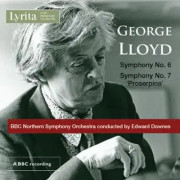

Symphonies 6 and 7 (Proserpine)
BBC Northern Symphony Orchestra
cond. Edward Downes. (BBC recordings)
Manufacturer: Wyastone Estate Limited, Wyastone Leys, Monmouth, NP25 3SR
Email:
The first work on the album, the Sixth Symphony from 1956, a three-movement score, is relatively short at just over twenty-two minutes. A stylish, compact work—it comes between two of Lloyd’s larger-scale symphonies—has a distinct Mendelssohnian appeal and emotional self-control to the writing. In the opening movement Allegro, a curious sense of near-anxiety is contrasted with lighter, more carefree writing; there is a memorable main theme. Warm and reassuring music lies on the surface of the Adagio, reminding me of a Tchaikovsky ballet. One soon realises that writing of a sad, yearning quality is never far away, yet it never becomes too profound. With the Mendelssohnian character in the Finale: Agitato it is easy to imagine lovers entering an enchanted forest inhabited by frolicking sprites and fairies in the manner of the incidental music to A Midsummer Night's Dream. The coda has an agreeable, festive, rather celebratory tone: an uplifting conclusion.
Lloyd worked on the three-movement Seventh Symphony in 1957/1959 and orchestrated it some fifteen years later. It is known by the title “Proserpine”. Lloyd was influenced by the tale of the goddess, a daughter of Ceres and Jupiter, and actually prefaced the score with a quotation about Proserpine. Later Lloyd wrote that Proserpine “seems to tell us something about the human condition of having one foot on earth and another somewhere else—wherever that may be”.
Throughout both works, Downes’s readings feel firm and assured. The BBC Northern Symphony Orchestra is hard to fault. The playing is quite superb, fluent and consistent with considerable rhythmic buoyance.
The sound quality of these BBC radio broadcasts recorded by Richard Itter is remarkable, exceptional in clarity and balance. Paul Conway’s detailed essay in the booklet is first-class, both interesting and informative. John Quinn, MusicWeb-International
The work gave rise to much soul-searching but ultimately earned praise from those otherwise unreceptive to this composer. Downes endows it with unstinting drama and is no less inside its diverting predecessor. Richard Whitehouse
"Lyrita released the first discs of George Lloyd’s symphonies on disc back in the early 1980’s, with LPs of the Fourth, Fifth and Eighth (reissued on CD in 2007). The conductor, Edward Downes undertook their first performances as well as those of the Sixth, Seventh and Tenth Symphonies, and this latest disc couples the former two of these in their broadcast premieres.
Resident near Sherborne in the 1950’s and ‘60s, Lloyd wrote on a part-time basis but managed to complete several major works. The present two symphonies make for a pointed contrast in all respects. The Sixth (1956) is the shortest of the cycle, its outer movements being deft takes on sonata and rondo designs so their immediacy of ideas is thrown into relief by their formal sophistication, while the central Adagio focuses on cor anglais melody of winsome poise.
Inspired by the Greek legend of Proserpine, the much larger Seventh Symphony (1959) could hardly be more different. It proceeds from an initial movement of a restraint belied by quirky ostinato rhythms and speculative harmony that takes on increasing volatility towards the close, through a central Largo whose eloquent melodic contours and ethereal orchestration make it Lloyd’s most affecting symphonic movement, to a finale that pursues an agitated course to a powerful climax, then an epilogue whose anguish is more telling for its enfolding inwardness.
The work gave rise to much soul-searching but ultimately earned praise from those otherwise unreceptive to this composer. Downes endows it with unstinting drama and is no less inside its diverting predecessor. Lloyds own recordings on Albany are well played with more spacious sound but the extra panache is unarguable. Maybe Downes’s broadcasts of the Ninth and Tenth Symphonies will emerge; even that of the Eighth, which began the Lloyd revival 40 years ago."
Richard Whitehouse